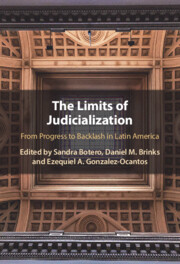Book contents
- The Limits of Judicialization
- The Limits of Judicialization
- Copyright page
- Contents
- Figures
- Tables
- Contributors
- Acknowledgments
- 1 Working in New Political Spaces
- 2 Critical Disconnects
- 3 When Winning in the Courts Is Not Enough
- 4 Forms of Countermovement and Counter-Reform in Latin America
- 5 Backlash against State Strengthening Reforms
- 6 Backlash against Corporate Accountability for Grave Human Rights Violations in Colombia
- 7 Courting Judicial Legitimacy
- 8 Family Ties and Nepotism in the Mexican Federal Judiciary
- 9 Judicial Corruption
- 10 Kickbacks, Crackdown, and Backlash
- 11 Turning Corruption Trials into Political Tools in the Name of Transparency
- 12 Fighting Corruption, Dismantling Democracy
- 13 Prosecutorial Agency, Backlash and Resistance in the Peruvian Chapter of Lava Jato
- Index
- References
1 - Working in New Political Spaces
The Checkered History of Latin American Judicialization
Published online by Cambridge University Press: 11 August 2022
- The Limits of Judicialization
- The Limits of Judicialization
- Copyright page
- Contents
- Figures
- Tables
- Contributors
- Acknowledgments
- 1 Working in New Political Spaces
- 2 Critical Disconnects
- 3 When Winning in the Courts Is Not Enough
- 4 Forms of Countermovement and Counter-Reform in Latin America
- 5 Backlash against State Strengthening Reforms
- 6 Backlash against Corporate Accountability for Grave Human Rights Violations in Colombia
- 7 Courting Judicial Legitimacy
- 8 Family Ties and Nepotism in the Mexican Federal Judiciary
- 9 Judicial Corruption
- 10 Kickbacks, Crackdown, and Backlash
- 11 Turning Corruption Trials into Political Tools in the Name of Transparency
- 12 Fighting Corruption, Dismantling Democracy
- 13 Prosecutorial Agency, Backlash and Resistance in the Peruvian Chapter of Lava Jato
- Index
- References
Summary
The Introduction outlines the trajectory of the literature on judicialization in Latin America, and presents the core argument of the book. The book argues that the institutional and cultural changes that empowered courts and put them at the center of policy disputes, what the editors call the “judicialization superstructure,” often fall short of the promise of greater accountability and rights protection. First, courts sometimes fail to account for persistent state weakness, pushing policies ahead of the state and societal infrastructure needed to support them. Second, judicial corruption, nepotism, and other intra-institutional pathologies occasionally diminish the transformative potential of courts and prosecutors. Third, courts’ and activists’ inability to root change in robust structures of support leads to political and societal backlash that frustrates reform efforts. As a result, and in spite of some notable successes, judicialization in certain areas produces limited impact and is met with aggressive responses from conservative forces. Finally, there are instances when the expectations of the architects of judicialization have been met all too well, especially in terms of strengthening mechanisms of horizontal accountability, but due to the broader context in which these mechanisms operate, effective judicialization can do more harm than good.
- Type
- Chapter
- Information
- The Limits of JudicializationFrom Progress to Backlash in Latin America, pp. 1 - 38Publisher: Cambridge University PressPrint publication year: 2022

